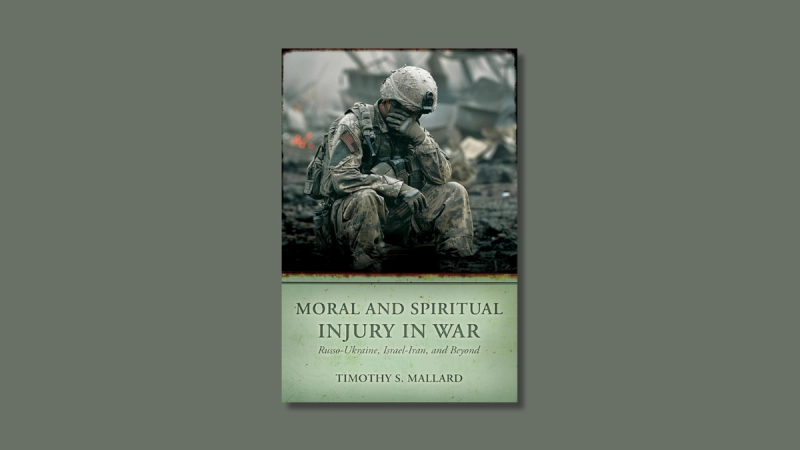Moral and Spiritual Injury in War: Russo-Ukraine, Israel-Iran, and Beyond
By Timothy S. Mallard
Stone Tower Press | 2025 | 160 pages (paperback) | $19.95
It should not surprise us to find rich theological and cultural insights coming from the realm of the military. After all, to deal with war is to deal with sin, suffering, grace, hope, and theodicy. It is often from the battlefield that we hear the question, “Why would a good God allow…?”
The trenches of World War I drew the starry eyes of modernist Europe down to the mud and blood of postmodern cynicism. The moral ambiguity and deceit of the Vietnam War did much the same in America. Why does war affect us so? Two concepts—moral and spiritual injury—might provide part of the answer. Dr. Timothy Mallard—a former Army chaplain—explains their importance is his new work, Moral and Spiritual Injury in War.
So what do each of these terms mean?
“Moral injury” was coined by Jonathan Shay, a VA counselor, in the 1990s to describe something that clearly didn’t belong to post-traumatic stress disorder. There was a different sort of woundedness, one that came from the witnessed or perpetrated transgression of deeply held moral beliefs (23). Deep feelings of shame, for example, do not belong to PTSD.
As this issue began to be discussed, it raised more questions than answers. What is actually being injured? The mind, heart, conscience, or soul? And when we speak of transgressions, we speak of a concept that has deeply religious, rather than psychological, roots. Mallard, alongside the International Centre for Moral Injury (ICMI), helps clean up a rather muddy concept:
Moral injury refers to the experience of sustained and enduring negative moral emotions—guilt, shame, contempt and anger—that results from the betrayal, violation, or suppression of deeply held or shared moral values. It is distinct from post-traumatic stress disorder (PTSD), which entails the body and mind’s adaptation to situations of extreme fear and stress. Moral Injury involves a profound sense of broken trust in ourselves, our leaders, governments and institutions to act in just and morally “good” ways. (26)
This concept already carries with it profound implications for how our culture—let alone the military—should both view the human person and treat the wounded heart. Consider that terms like “betrayal” and “violation” imply that there is some perception of an objective standard. Indeed, the definition (and many of those that came before) refers explicitly to “deeply held…values,” values, which Mallard argues later, are necessarily downstream from one’s belief system.
Does the reader not faintly hear the cracking of the iron Kantian curtain that stood between the things of the physical realm and those that lie beyond? What is this thing that is wounded? And how can the psychologist, aiming for neutrality in such matters, avoid dealing with inherently spiritual matters?
This draws us to the term, “spiritual injury,” which actually predates the term, “moral injury.” Again, perhaps the clearest definition of this term comes to us by the hand of Mallard, who describes it as:
A person’s deep wounding of the soul arising from life-altering trauma, misbalancing one’s core sense of self and threatening one’s relationships to others and God. (47)
While not identical with moral injury—and Mallard himself enumerates a number of distinctions—it takes us deeper into the human person and shows how trauma shakes the Edenic bonds of our personhood. This is terrain where many fear, but chaplains dare, to tread.
Understanding these twin concepts of moral and spiritual injury will better equip our country and the Christian church to better care for our soldiers, which makes this book essential reading for those leaders who (should) aspire to do so.
But this book provides even greater value beyond its original intent. As both Christian institutions and bastions of a cherished secularism disintegrate into the vast spiritual puddle that is already muddying our feet, we find apologetic tools that can help us out of the muck and mire.
The broader culture used to treat the problem of suffering as one that uniquely belongs to Christianity. As individuals take within themselves the prerogative of their own spirituality, they of necessity take its foremost question: What do we do with suffering?
Like our chaplains, we as Christians must be ready to respond to this cry.




